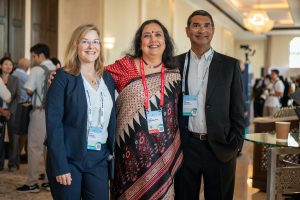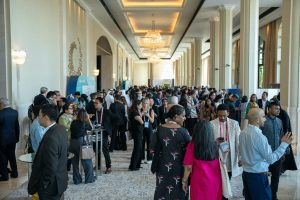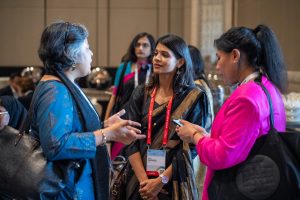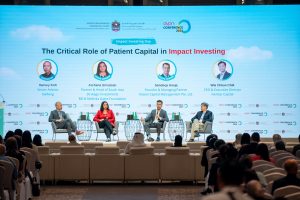AVPN’s Global Conference in the UAE offered promising and optimistic dissussions on faith-based giving, a call to action on youth mental health, a raft of giving from the Abu Dhabi government, and a hazy warmth. Alliance‘s Investments Editor Claudia Cahalane gives her reflections on the event, here.
‘Hosting the AVPN Global Conference in Abu Dhabi comes at a crucial moment for the whole of Asia, a region currently navigating through transformative economic shifts with sustainability at their core,’ came the opening address from AVPN’s CEO at the organisation’s global event last month.
Attending along with 1,500 others from the philanthropy and social investment world, I listened in as Naina Subberwal Batra introduced three days of plenaries, break outs and dinners centred around using wealth for good in Asia.
As pressure mounts to make some progress towards the UN Sustainable Development Goals, the atmosphere was frenetic at the event, titled ‘One Asia, One Future’. The prospect of rich young UAE nationals’ interest in philanthropy and the potential of faith-based giving to unleash monumental sums of money were hot topics.
As a member of the LGBTQ+ community with a strong interest in social equality and the natural world, the thought of going to Abu Dhabi hadn’t previously captured my interest. But I was drawn to explore the latest trends, and, some heat.
Generational wealth transfer in Asia
This moment in time has great potential, Badr Jafar, UAE special envoy for business and philanthropy told us in a plenary on the first day: ‘there’s a USD $26 trillion in generational wealth transfer across Asia and Africa expected to bolster philanthropic activity in the global growth markets within the coming decades’. A huge prospect indeed, and makes the few trillion dollar deficit in meeting the UN Sustainable Development Goals almost look manageable.
A week before our arrival, the United Arab Emirates experienced the heaviest rainfall ever recorded in the country. But we were greeted by a dry, hazy heat. The heat was welcome after a cold UK winter. The haze, likely pollution, less so.
According to a Guardian newspaper report in September 2023, the UAE’s levels of toxic particles in the air are almost three times the World Health Organization’s recommended levels.
The country received plenty of scrutiny on its environmental record while hosting climate conference COP28 last year. Despite ambitious energy transition plans, fossil fuel is its big business. The city is heavily focused on industry. On day two of the conference, impact investing day – one of the main Emirates’ projects receiving focus was an aeroplane parts factory.
Abu Dhabi – A rich history of philanthropy
The AVPN convening, now in its eleventh year, has previously been held in Bali and Kuala Lumpa. Abu Dhabi, which is sometimes modernly referred to as West Asia, was our host this year. And being geographically located between several continents, it was presented as an important causeway between nations.
‘Abu Dhabi has a rich tradition of philanthropy which is deeply rooted in its cultural and religious heritage from traditional forms of giving, such as Zakat and Sadaqah.’
‘Abu Dhabi occupies a very important geopolitical position serving as a bridge between Asia, Africa and Europe,’ said Subberwal Batra in her opening address. ‘Its strategic location and abundant natural resources make it a key player in global affairs.
‘Abu Dhabi has a rich tradition of philanthropy which is deeply rooted in its cultural and religious heritage from traditional forms of giving, such as Zakat and Sadaqah, to modern philanthropic initiatives. There is a wealth of resources and expertise that can be harnessed to drive positive change,’ she said.
Tolerance, love and kindness
In the opening speeches by officials – who are unelected rulers; there are no political parties in UAE – there was much talk of tolerance, love, kindness, and of giving being a service. There was a hopeful opening address by the minister for tolerance and co-existence. But, it’s hard to ignore what’s on the UAE homepage of Human Rights Watch’s (HRW) website: ‘the UAE invests in a strategy to paint the country as progressive, tolerant, and rights-respecting, while carrying out repression against dissent.’
The charity lists numerous issues, such as wide-scale surveillance of technology and public spaces. It’s also long documented how the ‘kafala’ system (migrant worker programme) facilitates abuse and exploitation. LGBTQ+ relationships or expressions are illegal. Men have a lot of power – arrests only come if instructed by a male family member or guardian; and, women require permission of male guardians to do certain things.
On the first morning, His Excellency Sultan Al Shamsi, the UAE’s assistant minister of foreign affairs for development and international organisations, spoke of the UAE’s position in the philanthropy world. He is also a member of the newly created International Humanitarian and Philanthropic Council.
‘The UAE has a rich history and culture of giving, rooted in the example of our founding father, the late Sheikh Zayed bin Sultan Al Nahyan, whose lifelong commitment to helping those in need shaped the values of our nation, and has served to ensure Emiratis past and present understand their responsibilities as global citizens,’ he said.
UAE philanthropic funding commitments
A raft of funding commitments from the UAE came quickly in the first morning plenaries. They included USD $50 million to the Lives and Livelihoods Fund. The Fund is an initiative run by the Abu Dhabi Fund for Development to support Islamic Development Bank member countries in building sustainable pathways out of poverty.
There was also a $15 million promise by Abu Dhabi-based Global Institute for Disease Elimination to tackle infectious diseases, driven by Reaching the Last Mile. This is the philanthropy of UAE President, Sheikh Mohamed bin Zayed Al Nahyan. Plus, $40 million for the Mohamed bin Zayed Species Conservation Fund.
AVPN’s report ‘How Values and Beliefs Shape Giving’, explores the great potential for faith-based giving in Asia.
Over the next three days, some huge subjects were on the agenda – from the youth mental health crisis, to cleaning up waterways in Asia, especially in Indonesia, and the massive potential for faith-based lending to solve social and environmental problems.
The great potential of faith-based giving
We were briefed in advance that faith-based giving would be an important part in the convening, with a plenary, a break out, as well as break time chats on the subject. And, just before the first coffee break on day one, there was a plenary titled ‘Why We Give: Values, Beliefs, and Motivations that Drive Impact’ in the main hall at the St Regis Hotel, one of the conference venues.
A call to recognise the immense power within our faith communities, to bridge the gap between faith and impact, and to unleash a wave of resources that can truly transform our region’ – Naina Sutterwal Batra, AVPN CEO.
The session was designed to mark AVPN’s renewed commitment to highlighting the role of values-aligned giving in addressing Asia’s most pressing social issues. It coincided with their report ‘How Values and Beliefs Shape Giving’, which again explores the potential for faith-based giving in Asia, where it says there are vast resources to advance social and environmental progress.
A wave of resources to transform Asia?
In the report, Subberwal Batra opens: ‘In Asia, where faith traditions hold immense sway, there’s a curious gap in our understanding of faith-aligned giving. We talk about impact investing, philanthropy, and social entrepreneurship, but the unique dynamics and motivations of faith-aligned actors often remain veiled.
‘This is where AVPN steps in. As a neutral platform dedicated to unlocking more capital for good, we’re taking a bold step towards shining a light on this hidden powerhouse. This is more than just another initiative; it’s a call to action. A call to recognise the immense power within our faith communities, to bridge the gap between faith and impact, and to unleash a wave of resources that can truly transform our region.’
Panellist Tom Hall, global head of social impact and philanthropy services at UBS Optimus Foundation, reminded us in the plenary of the reported staggering $5 trillion worth of net assets across the world’s four main religious groups.
Health inequalities and better pay for community health workers
In other morning sessions, including Bridging Divides: Tackling Social and Health Inequities in Asia, panellists explored efforts to address issues like HIV, MMR, and Covid-19. Tala Ismail Al Ramahi, chief strategy officer of Reaching the Last Mile, called for better remuneration for community health workers, who are mainly women, as an important mechanism for achieving better social and health equality.
Climate and the connection between climate change and health, in particular, received a focus at the event. There were also several sessions on elevating women, and financial inclusion.
A lot of delegates seemed to come from Indonesia, which is perhaps understandable, given that for the last six years the country has been listed as the world’s most generous nation, according to the World Giving Index. Others were from from Malaysia, Hong Kong, US and the UK, based on most of my conversations.
But more nations were represented. I also met someone from a women’s fund in Mongolia who had wanted to put on a session on the agenda, but was unable to afford what was a prohibitive sum of money for her. We talked about whether smaller organisations could afford the conference, and she mentioned that the Channel Foundation had sponsored eight women to attend.
Youth mental health in Asia
I met very few women from the UAE. Just two, in fact, who were attending a session on Scaling Equitable Access to Markets and Supply Chains for Women Entrepreneurs. I was taking part in a nearby session on youth mental health which coincided. We got chatting afterwards and I asked them about support for women’s mental health in the UAE. It was excellent to hear that there are various offerings available, including helplines which they said women found useful.
While it was a shame these two sessions clashed with each another, the Investing in Potential: Exploring Intersectionality of Youth Mental Health was an important discussion. It was one of the least well attended sessions I went to, but a rich conversation took place between experts from Hong Kong, Malaysia and other parts of Southeast Asia. It was chaired by AVPN Young Impact Leader, Natalia Vera Haw.
Dr Nur Anuar Abdul Muthalib, head of education, strategy and partnership at Yayasan Hasanah, the philanthropic arm of Malaysia’s sovereign wealth fund Khazanah Nasional, had some striking figures to share. Since the COVID-19 pandemic, he said calls to the national mental health helpline had tripled from their previous rate of 200,000 calls a year. Panellist also spoke of the rise in youth suicides in Asia.
Funders lack mental health knowledge and understanding
Dr Abdul Muthalib went on to say that knowledge of mental health was usually poor among funders: ‘There’s a lack of understanding of what mental health is; there’s a steep learning curve for funders. They need to be educated to put more resources into this.’
‘Mental health is a thread that goes through all issues we’re facing, including livelihood, child protection and climate change. It needs to be factored into programme planning, no matter what your programme is.’
Winnie Mak, a psychology professor at the Chinese University of Hong Kong and founder of youth digital mental health service TourHeart+, solely funded by the Hong Kong Jockey Club, explained how mental health is more hidden in Asia than in Europe. She said: ‘There’s a concern that mental health issues can reflect badly on a family, they’re stigmatised’.
Her organisation TourHeart+ is having impressive success and expanding with further investment. It currently has 34,000 registered users. The platform’s anonymity and easy access make it popular with young people. Upon returning to the UK, I tried the platform and found it extremely useful for helping to understanding mood and state of mind.
Fellow panellist Dr Natasha Reyes, programme manager for the Kadoorie Charitable Foundation, who worked in Southeast Asia and Hong Kong to improve the health, mental health, education and sustainable livelihoods of vulnerable populations, issued a strong message. Speaking to philanthropist and social investors, she said:
‘We want more of you at the table. Mental health is not just for healthcare providers. It’s for everyone, and is a thread that goes through all issues we’re facing, including livelihood, child protection and climate change. It needs to be factored into programme planning, no matter what your programme is.’
Social investment in UAE
The first plenary session on day two – impact investing day – gave us a flavour of where some of Abu Dhabi’s social investment is directed. The aforementioned airbus factory was spoken about as an important project for the country. This appeared to be because it provided jobs mainly to women, in an area of UAE with limited industry and facilities.
Investment for the factory came via the UAE’s sovereign wealth fund Mubadala – a USD $302 billion business that spans six continents. Mubadala manages a diverse portfolio of assets and investments in the UAE and abroad, to generate sustainable financial returns for its shareholder, the Abu Dhabi government. It seems there is major resource here to create social change. And I was told that the company is very focused on social impact. But, I would’ve liked to have heard more about how such an operation worked towards social and environmental equality and impact.
Patient capital: social projects need to be allowed more development time than they’re often given by common funding methods, was the message.
Social investment day brought us an opening address from Vikas Arora, AVPN’s chief of impact investing, along with conversations on blended finance, patient capital, climate finance, more on Islamic finance and propelling women’s leadership in impact investing. Discussions covered how important it is to get more capital to the Global South, and to make sure that new infrastructure is built with low carbon technology, so it doesn’t have to be retrofitted.
Social projects need patient capital
Speakers hoped for increased government offerings in blended finance packages to encourage investment. In the patient capital conversation, there was talk around how genius innovation takes time. ‘Unlimited time is needed when building something huge like Google Maps,’ commented one delegate, hoping to encourage investors to offer longer investment terms. Social projects need to be allowed more development time than they’re often given by common funding methods, was the message.
We learned that AI might help with the relentlessly discussed topic of impact measurement. That rich young UAE nationals are focused on individual giving. And that a new AVPN collaboration with an organisation funded by the Gates Foundation and others has created a web platform selling social outcomes to investors.
On the final day, there was another big conversation on youth wellbeing in the main hall, this time with bigger names in the sector participating – this conversation felt more broad and not as deep or quite as inspiring. However it was good to hear from a representative from the Gates Foundation that mental health kept coming up near top of the list in conversations at various events he’d been to in Asia in the preceding weeks.
Rich networking opportunities at AVPN global conference
By this point many of us were a little worn out after lively networking all day and most of the evening, including some great conversation on the shuttle bus between venues throughout the day. But one of the most interesting and inspiring connections did come on the last day. Over lunch, I spoke with Syed Mashhood Rizvi, executive director communications and resources at Indus Hospital Health Network in Pakistan.
His organisation’s work on providing what sounds like a particularly progressive and supportive environment for mental health patients, seems so very needed in every city of this world. Interestingly, given one of the big subjects that had come up at the conference – faith-based investing – the hospital network had just received a $70m Ramadan donation before the conference.
Indus’ whole person approach to mental health was heartwarming and affirming. And, that donation is a testimony of the power of faith-based giving. It puts the day one $15 million investment to tackle infectious diseases, while still very big, a little in the shadows. So, it looks like AVPN is really on to something with its work to pull together faith-based investing across Asia, and channel its enormous power for positive social and environmental progress.
Claudia Cahalane is investments editor at Alliance










Comments (0)